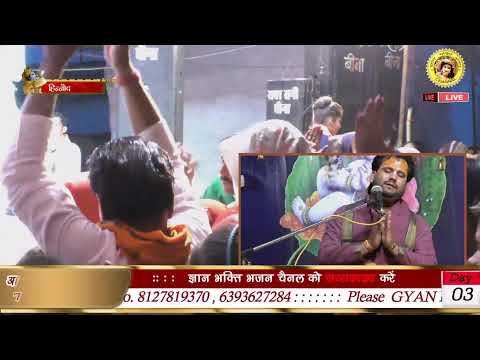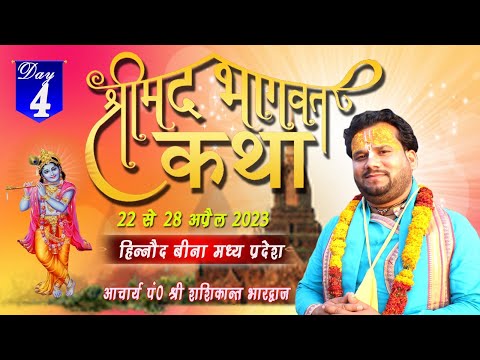Acharya Shashikant Bhardwaj, a renowned youth Bhagwat Katha Vachak, has made a significant impact with his devotion, teachings, and commitment to spreading the spiritual wisdom of the Shrimad Bhagwat Katha. Through his insightful teachings, accurate predictions, and compassionate guidance, Acharya Shashikant Bhardwaj has touched countless lives, helping individuals navigate life’s challenges while deepening their understanding of themselves and the universe.
Acharya Shashikant Bhardwaj Bio Wiki

| Category | Details |
| Full Name | Acharya Shashikant Bhardwaj |
| Birth Date | July 10, 1992 |
| Birthplace | Bina, Madhya Pradesh, India |
| Parents | Father: Shri Ram Swaroop Bhardwaj<br>Mother: Shrimati Kamla Devi |
| Siblings | Rishi Kumar Bhardwaj (Brother)<br>Rakhi Bhardwaj (Sister) |
| Education | Learned Shukla Yajurveda and Karmkand<br>Sanskrit Vidhyalay Bajrangarh, Guna, Madhya Pradesh<br>Further studies in Bhagwat Katha in Vrindavan, Uttar Pradesh |
| Notable Place | Conducted first Bhagwat Katha in Vidisha, MP<br>Famous Bhagwat Katha Vachak from Vrindavan |
Early Life and Education
Acharya Shashikant Bhardwaj was born to Shri Ram Swaroop Bhardwaj and Shrimati Kamla Devi. In his family, he has two siblings, a brother named Rishi Kumar Bhardwaj and a sister named Rakhi Bhardwaj. From an early age, he exhibited a deep inclination towards spirituality and a desire to understand the intricate teachings of ancient scriptures.
His educational journey in spirituality and religious studies began when he pursued Shukla Yajurveda and Karmkand at Sanskrit Vidhyalay Bajrangarh in Guna, Madhya Pradesh. However, his quest for spiritual knowledge didn’t stop there. Driven by a strong calling, he moved to the holy town of Vrindavan in Uttar Pradesh to delve deeper into the teachings of the Bhagwat Katha.
Acharya Shashikant Bhardwaj: Emergence as a Leading Bhagwat Katha Vachak
Acharya Shashikant Bhardwaj’s journey as a Bhagwat Katha Vachak took flight with his first Bhagwat Katha in Vidisha, a village in Madhya Pradesh. It’s worth noting that Vidisha holds a special place as his mother’s birthplace. Since then, he has conducted numerous Bhagwat Kathas, captivating audiences with his insightful narrations and meaningful interpretations of the ancient scriptures.
Read More: Top 10 Katha Vachak In India List With Full Details 2023
Acharya Shashikant Bhardwaj’s Teaching Philosophy
At the heart of Acharya Shashikant Bhardwaj’s teaching philosophy lies the belief that all human beings are children of the same divine entity. He expounds on reincarnation and the law of Karma, asserting that individuals undergo multiple births to reap the fruits of their actions. His teachings underscore the significance of devotion, worship, and righteous living.
He emphasizes the authenticity of mantra recitation and advocates worshipping thrice daily. Additionally, his philosophy is rooted in moderation, urging his disciples and himself to embrace a balanced way of life. A remarkable aspect of his teachings is the inclusivity he promotes – anyone, regardless of caste, creed, colour, faith, or religion, is welcome to partake in his spiritual teachings.
Acharya Shashikant Bhardwaj’s Contributions and Impact
Acharya Shashikant Bhardwaj’s contributions extend beyond his discourses. He is known for his involvement in collecting funds through the recitation of the Shrimad Bhagwat Katha, which supports various charitable initiatives. His teachings and spiritual guidance have touched the lives of many, inspiring them to lead a life of devotion, virtue, and self-realization.
Conclusion
In conclusion, Acharya Shashikant Bhardwaj’s journey as a Bhagwat Katha Vachak exemplifies his dedication to spiritual growth, devotion, and the upliftment of humanity. His teachings resonate with seekers from all walks of life, fostering a sense of unity, enlightenment, and a deeper connection to the divine.
Read More:
- Morari Bapu Biography, Bhagwat Katha Vachak Journey, Education, And More
- Devi Chitralekha Biography, Early Life, Marriage, Spiritual Journey & Much More
- Shri Indresh Upadhyay Biography, Birth Place, Profession, Early Life & More

